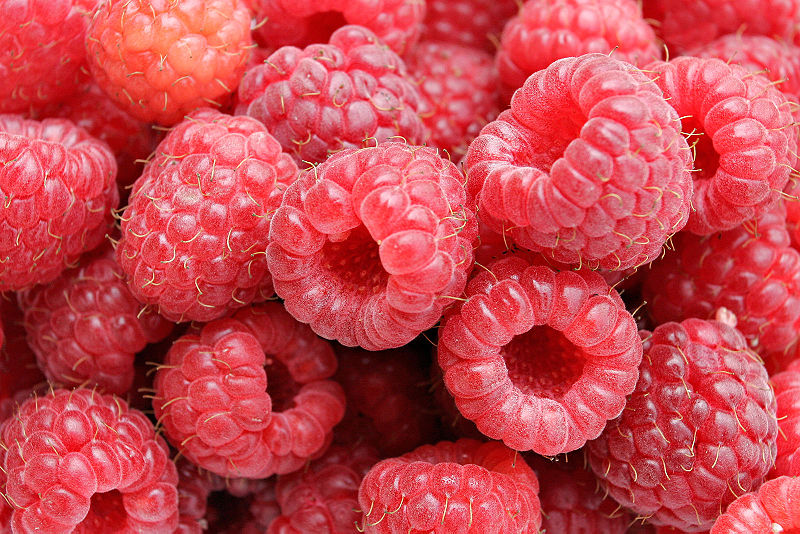Raspberries
2012

Raspberries have potent antioxidant capabilities. Ellagic acid, a potent anti-carcinogen that stops tumors, kills cancer cells and strengthens connective tissue amongst other great things, is found in highest quantities in raspberries.
About – Raspberries are perennial, a member of the rose family and a bramble fruit like the blackberry. There are over 200 species of raspberries and both loganberries and boysenberries are hybrids of the raspberry. Raspberries are most commonly seen in their red-pink color but also come in gold, orange, purple and black, with gold being the sweetest. They are known as aggregate fruits, as they are made up of smaller seed-containing fruits, called drupelets, which each contain their own seed and are arranged around a hollow central cavity. Raspberry season is late summer to fall and most cultivated varieties of raspberries are grown in California from June through October.
Nutrition – Raspberries are filled with an abundance of nutrients. They are exceptionally high in the B vitamins and vitamin C. Raspberries are mineral rich with high levels of magnesium, potassium, iron and copper, and highest in manganese, a potent antioxidant. Raspberries do not have any fat, saturated fat, sodium or cholesterol. They are a significant source of ellagic acid, a phenolic compound found in high quantities in the raspberry. This substance is known to have potent anti-carcinogenic and anti-cancer properties. Raspberries are often the source of the dietary supplement ellagic acid, sold in health food stores. Ellagic acid is considered a tannin, a phytonutrient found naturally in raspberries, and other red-blue fruit. Raspberries also contain anthocyanins, especially cyanidin and pelagonidin glycosides, which give these berries their deep colors and add to their amazing antioxidant activity. Raspberries have antimicrobial properties, including the ability to prevent overgrowth of certain bacteria and fungi in the body, such as candida. Studies have shown raspberries to possess almost 50% higher antioxidant activity than strawberries, three times that of kiwis, and ten times the antioxidant activity of tomatoes. They are also an excellent source of salicylic acid, a compound closely related to aspirin that may inhibit arteriosclerosis, hardening of the arteries. Thanks to all their little seeds, raspberries provide high amounts of insoluble fiber and as well they contain the soluble fiber pectin, which helps to control cholesterol levels. The combination of nutrients makes raspberries a great fruit choice for having low impact on blood sugars.






